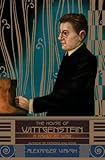 The Rise and Fall of the House of Wittgenstein by Alexander Waugh
The Rise and Fall of the House of Wittgenstein by Alexander WaughMy review
rating: 4 of 5 stars
My recent doxographical inamorata The Book of Dead Philosophers relates this anecdote about Ludwig Wittgenstein: “After he had been diagnosed with terminal cancer . . . [a friend:] presented him with an electric blanket on his birthday and said, ‘Many happy returns.’ Wittgenstein replied, staring back at her, “There will be no returns.’” Not a cheery man, was Ludwig (though perhaps vindicated by his death three days later).
But he came by it honest, as I learned reading this well-researched and diverting biography of his family, written by Evelyn Waugh’s grandson Alexander. Depression certainly was a hereditary curse: three of the five sons of Karl and Leopoldine Wittgenstein committed suicide—Hans simply disappeared; Kurt, an officer in the Austrian army, shot himself at the end of the Great War; Rudi theatrically drank potassium cyanide at a cafe, after requesting his favorite song. But the Wittgensteins were also brilliant, musical, and driven. The other surviving brother, Paul, made his debut as a concert pianist in December 1913, an inauspicious time for any young European man to start a career; less than a month after war was declared, he’d lost his right arm and been captured by the Russians. He spent months being shuffled amongst Siberian prison camps, rewriting concertos—from memory—for just the left hand, tapping out the arpeggios on tables and packing crates. Astonishingly, he spent the rest of his life playing piano professionally, commissioning works for the left hand from Strauss, Prokofiev, Ravel, and Britten, among others.
The story of this idiosyncratic and unhappy clan serves as a microcosm of larger experiences. During the late 1930s, for instance, when Austria joined with Nazi Germany in Anschluss, the siblings found themselves suddenly Jewish: three sets of grandparents were born in that faith, and their later conversions meant nothing to the Reich. Ludwig was in Cambridge, and safe; sister Gretl was married to an American, thus untouchable; but Paul had had two children with an irreproachably Aryan mistress, making him guilty of “race pollution.” He fled to Switzerland and eventually Cuba, and managed to smuggle out his mistress and daughters too. Hitler’s genocidal ideology, however, was not immune to corruption, and the Wittgensteins were rich. Very rich, even after losing a great deal to runaway inflation in the decades between the wars, when consumer prices in Austria rose 14,000-fold. (Gretl’s American investments took a hit in 1929, of course, but she was still left with an income of $30,000 a year.) The Reichsbank essentially held the two sisters remaining in Vienna hostage until the others relinquished a great deal of their fortune, whereupon one of their grandfathers became the illegitimate son of German nobility, and presto! they were Mischling (half-breed), a far more advantageous social and legal status.
Ludwig famously ended his most significant work, Tractatus Logico-Philosophicus, with the engimatic proposition “What we cannot speak about we must pass over in silence,” and I’m afraid I must echo him here: I can’t possibly tell all the stories I found in this lively history, so I’ll just end the attempt.
 The King's Rifle: A Novel by Biyi Bandele
The King's Rifle: A Novel by Biyi BandeleMy review
rating: 3 of 5 stars
Every now and then you read some galling statistic about how many American adults think the Germans attacked at Pearl Harbor in 1861, and if you’re like me (and really, you wouldn’t be reading this if you weren’t), you always feel a heady mix of horror and amour-propre. With a historically-minded papa and more books on WWII in the house than you could shake an Enfield at, I thought I was pretty well up on the conflict, so I was surprised and chagrined to learn of an entire theater I’d never heard about: Burma, where thousands of Japanese and British troops perished in brutal battle over some of the most inhospitable territory of the war. And, like so many discoveries of mine, it came through art: one night Turner Classic Movies broadcast the 1956 Best Foreign Film Oscar winner, Kon Ichikawa’s haunting The Burmese Harp, about a young Japanese soldier’s quest to bury his fallen comrades; then, a few weeks later, I picked up The King’s Rifle, Nigerian writer Biyi Bandele’s stark, spare rendering of one West African soldier’s experiences during the campaign. (Realizing that Africans, as British colonials, played their own part in WWII was another humbling moment.)
Bandele, who lives in London, takes an ancient theme—the absurdity and suffering of war, old hat practically since the Iliad—and adds to it the only way any writer can, with a sharp and specific snapshot of an individual unwittingly taking part in the universal. Farabiti (dialect for “Private") Ali Banana is barely fourteen, but eagerly left his village to fight for Kingi Joji; shipped to Burma, he is deployed with the Chindits, a multicultural strike force that fought entirely behind Japanese lines. In graceful, dispassionate prose, Bandele chronicles pride and bravery against daunting odds: disease, homesickness, rough terrain (not just jungle, mountainous jungle!), even the multiple languages necessary for the polyglot unit to function (Hausa, Fulani, Yoruba, Burmese, Hindustani, Nepalese), all seem to doom them before the shooting even starts. The King’s Rifle is a reminder that we will never know enough about war, even when we think we know too much.








No comments:
Post a Comment